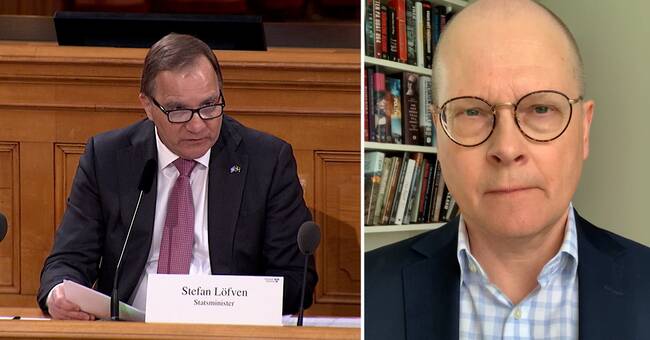In April last year, the Swedish corona strategy was published on the government's website.
But this was not preceded by any formal government decision.
When Prime Minister Stefan Löfven was asked about this during Monday's KU hearing, he replied, however, that he had seen the strategy in advance and approved it, but that the government had not made any special decision.
The lack of a formal government decision may be decisive for whether KU chooses to criticize the government's actions during the corona pandemic.
The government is ultimately responsible
KU's role is to, among other things, review the Government's and the Prime Minister's performance of duties based on the Constitution.
According to the constitution, it is the government that governs the country and thus is ultimately responsible even in a national crisis.
Prime Minister Stefan Löfven claimed during Monday's hearing that it did not matter to the government's actions that there was a lack of a formally decided strategy.
It has not worsened or affected the efforts of the government or the authorities during the pandemic.
According to the Prime Minister, the strategy has developed gradually and by consensus.
The political criticism of the government, however, is that the government has too much allowed itself to be controlled by the Swedish Public Health Agency and that the strategy has changed over time.
Critical questions of this kind were asked during the KU hearing and several questioners questioned whether the government had not passed on too much of the responsibility for crisis management to the Swedish Public Health Agency.
The Prime Minister rejected this, but referred to the Swedish administrative model which gives the authorities a strong position, even in times of crisis.
It would be wrong not to listen to the Public Health Agency's experts during a pandemic, the Prime Minister said.
Denied herd immunity as a strategy
Löfven was also asked if the Swedish strategy last spring had been focused on achieving herd immunity and that this had contributed to certain far-reaching measures never being relevant.
That this was the case, however, the Prime Minister emphatically denied.
The questions in KU reflected much of the political criticism leveled at the government during the pandemic.
That measures were either insufficient, too late or incorrectly timed.
These included the fact that testing started too late, that a restraining order on nursing homes was not introduced quickly enough and that the autumn reliefs in the restrictions were introduced at about the same time as the spread of infection picked up again.
KU can have views on this
Another issue was the so-called pandemic law, which was introduced last spring, but which was not extended when it expired during the summer.
Once the government began working on a new temporary pandemic law in the autumn, it happened so late that it was forced to force work due to a sharp increase in the spread of infection in November, but especially in December.
When KU's members are now to evaluate the spring's review work and the hearings that have been held, it is thus a matter of taking a stand on the government's actions.
Perhaps the most important question is how the committee values the lack of a formally decided national strategy for combating the crisis.
But also the government's handling of the pandemic law and the role the government has given the Public Health Agency in crisis work can be things that KU has views on.

